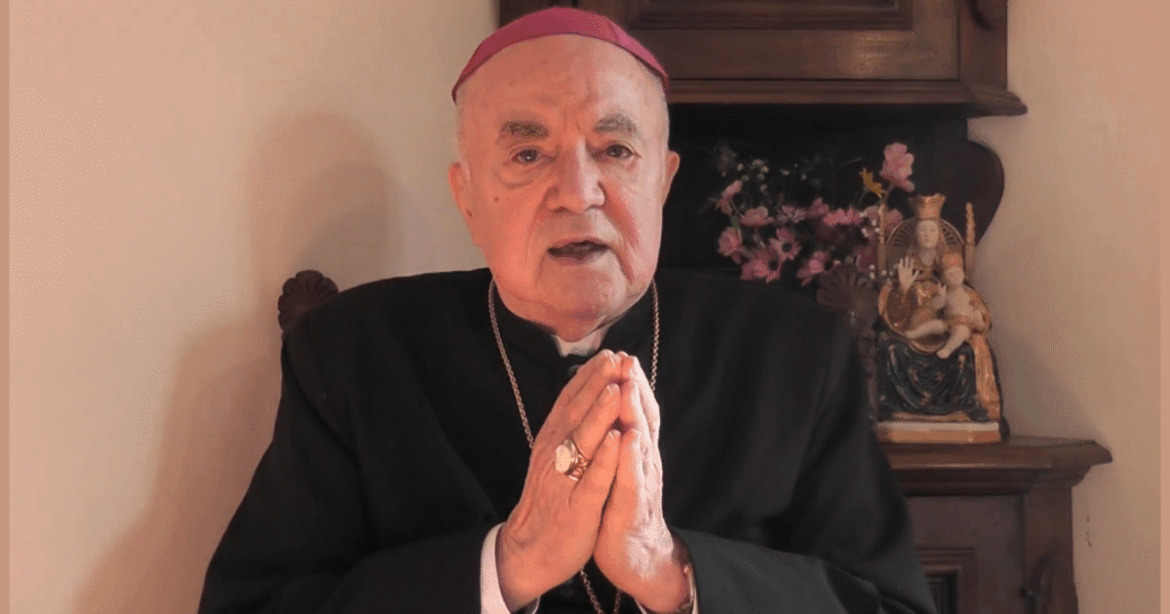Archbishop Carlo Maria Viganò has released the full text of a powerful interview originally scheduled to air on Italy’s Mediaset program “Fuori dal Coro” on April 23, 2025. Without any explanation or apology, the network pulled the segment. Viganò, refusing to be silenced, has made the full interview available to the public, offering a sweeping and scathing critique of the late Pope Francis (Jorge Mario Bergoglio) and his legacy.
A Vatican Under Siege
Viganò accuses a “subversive lobby” of orchestrating a globalist coup not only in governments around the world but within the Catholic Church itself. He traces the roots of today’s crisis back to the Second Vatican Council, which, he asserts, opened the Church to worldly ideologies. In Viganò’s analysis, Pope Benedict XVI stood as a bulwark against the globalist agenda — opposing LGBTQ ideology, mass migration policies, and the broader aims of Agenda 2030. In contrast, Viganò alleges, Pope Francis was installed to facilitate the very forces Benedict resisted.
According to Viganò, the Saint Gallen Mafia — a cabal of progressive Church officials — collaborated with deep-state actors in the United States and beyond to push Benedict into resignation and elevate Francis. The objective, he claims, was to transform the Catholic Church into a compliant institution serving the goals of the New World Order.
Denouncing Heresy and Corruption
Viganò further accuses Pope Francis of promoting heretical ideas, specifically pointing to alleged statements made to journalist Eugenio Scalfari, where Francis reportedly denied the existence of Hell. Such views, Viganò asserts, contradict the core teachings of Sacred Scripture and Catholic Tradition, placing Francis firmly outside the bounds of orthodoxy.
Moreover, Viganò catalogues a litany of scandals, including the shielding of corrupt clergy, the persecution of faithful prelates, and the lifting of sanctions on disgraced figures such as Jesuit artist Marco Rupnik. He portrays the late Pope’s inner circle as comprised of morally compromised figures willing to dismantle the Church’s foundations for the sake of ideological conformity.
The Case for an Illegitimate Papacy
In one of his most striking claims, Viganò argues that Pope Francis’ ascent to the papacy was canonically invalid. He suggests that Bergoglio’s understanding and acceptance of the papacy was so fundamentally flawed — viewing it as a tool to reshape rather than safeguard the faith — that his election is rendered null and void by defect of consent. Consequently, Viganò labels him not merely a bad pope but an anti-pope, whose actions have left the Church in a state of profound crisis.
What Comes Next for the Catholic Church
Viganò warns that the upcoming Conclave, populated overwhelmingly by cardinals appointed by Francis, may struggle with legitimacy. Even a faithful successor, he fears, would inherit a structure compromised by illicit appointments and distorted doctrines.
Yet, he offers hope rooted in divine providence. Comparing the Church’s current suffering to Christ’s Passion, Viganò encourages the faithful to remain steadfast. Just as Good Friday was followed by the Resurrection, so too will the Church rise again, purified and renewed.
Quoting Christ’s own words, Viganò concludes: “Do not be afraid: I have overcome the world.”

